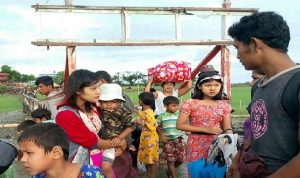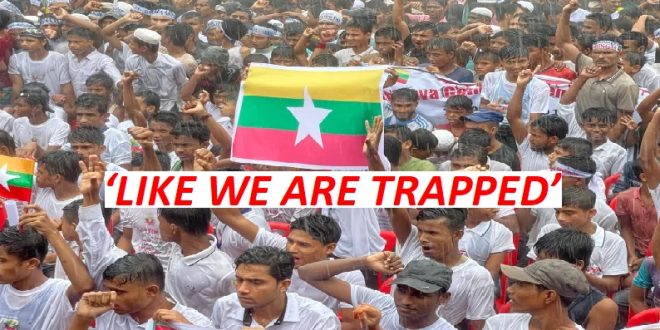07-10-2024
NAYPYIDAW: Earlier this year, artillery fire crashed through U Khup Thang’s home in Paletwa, in western Myanmar’s Chin State, killing his son. “It felt like a nightmare. I still struggle to find the words to describe it,” said U Khup Thang, an ethnic Chin farmer and laborer. Like others interviewed, he is using a pseudonym for security reasons.
 U Khup Thang is one of the hundreds of thousands of people in western Myanmar whose lives have been turned upside down since last November when the Arakha Army (AA), a powerful ethnic armed group formerly known as the Arakan Army launched coordinated attacks against military positions.
U Khup Thang is one of the hundreds of thousands of people in western Myanmar whose lives have been turned upside down since last November when the Arakha Army (AA), a powerful ethnic armed group formerly known as the Arakan Army launched coordinated attacks against military positions.
The attacks opened a new front in a countrywide uprising against the military, which seized power in a 2021 coup. They also marked the beginning of the AA’s second major offensive since 2018, as it seeks to advance its “Arakan Dream” of autonomy over an area which ethnic Rakhine people consider their homeland.
The AA has since made dramatic territorial gains, seizing most of central and northern Rakhine State as well as Paletwa, Chin State. According to a report published in August by the International Crisis Group, the AA now seems to be “on the verge of expelling the military” from the rest of Rakhine State.
The military has retaliated for the AA’s gains by bombing and shelling markets and residential areas. It has largely targeted ethnic Rakhine people for their perceived support to the AA, but other communities have also found themselves caught up in the violence.
In February, the military began a recruitment drive targeting Rakhine State’s persecuted Muslim Rohingya minority, using methods that included abductions, threats and coercion to bring them into its fight against the AA, according to Human Rights Watch (HRW). Crisis Group and others reported that the military had also collaborated with Rohingya armed groups based in neighboring Bangladesh.
 Following these developments, AA forces burned Rohingya villages and killed Rohingya civilians in Rakhine State’s northernmost townships. The AA has denied the allegations, instead blaming the military and “Muslim militants” for the violence.
Following these developments, AA forces burned Rohingya villages and killed Rohingya civilians in Rakhine State’s northernmost townships. The AA has denied the allegations, instead blaming the military and “Muslim militants” for the violence.
Civilians across all communities, meanwhile, are bearing the burden of the conflict. According to the Center for Arakan Studies, an independent research and rights monitoring organization, more than 420 civilians have been killed across Rakhine State and Paletwa Township since November and nearly 1,000 were injured in conflict-related violence. Some 327,000 people have also been forced from their homes by the fighting, according to the United Nations, which estimated in May that about three million people nationwide had been displaced as a result of conflict, 90 percent of them since the coup.
Media spoke with members of six minority groups from Rakhine State and Paletwa. They said the fighting, as well as military blockades on water and road access into the state, had added to the hardships for communities already struggling to survive, while also threatening their lives.
“The conflict disrupted the flow of basic goods including medicine and drove up prices, leaving us feeling helpless,” said U Khup Thang of the months before his house was shelled. Now, living outside the state with support from his church, he wants to return home but is afraid of what might happen. “I have already suffered greatly once,” he said. “I worry that I might not survive this crisis. I cannot afford anything and lack the means to protect myself.”
In April, Naing Naing closed his shop in the state capital of Sittwe and moved to Yangon with six members of his family. He is still looking for a new source of income. “We had to start over and build a new life,” he said. (Int’l News Desk)
 Pressmediaofindia
Pressmediaofindia




